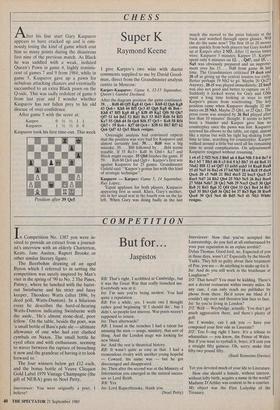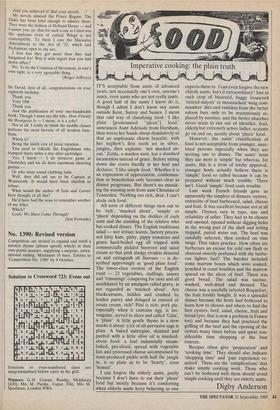COMPETITION
But for...
Jaspistos
In Competition No. 1387 you were in- vited to provide an extract from a journal- ist's interview with an elderly Chatterton, Keats, Jane Austen, Rupert Brooke or other similar literary figure.
The Beerbohm drawing of an aged Byron which I referred to in setting the competition was surely inspired by Max's visit in the spring of '99 to No. 2 The Pines, Putney, where he lunched with the burnt- out Swinburne and his strict and fussy keeper, Theodore Watts (after 1896, by deed poll, Watts-Dunton). In a hilarious essay he describes the hard-of-hearing Watts-Dunton indicating Swinburne with the aside, 'He's almost stone-deaf, poor fellow.' On the table, beside the poet, was 'a small bottle of Bass's pale ale — ultimate allowance of one who had erst clashed cymbals on Naxos. The small bottle he eyed often and with enthusiasm, seeming to waver between the rapture of broaching it now and the grandeur of having it to look forward to.'
The four winners below get £12 each, and the bonus bottle of Veuve Clicquot Gold Label 1979 Vintage Champagne (the gift of NERA) goes to Noel Petty.
Interviewer: You were originally a poet, I believe? RB: That's right, I scribbled at Cambridge, but it was the Great War that really launched me. ;Everybody was at it.
Int: I'm sure you're being modest. You had quite a reputation. RB: For a while, yes. 1 wrote one I thought rather good beginning 'If I should die', but I . didn't, so people lost interest. War poets weren't supposed to return.
Int: Then afterwards?
RB: I found in the trenches I had a talent for amusing the men — songs, mimicry, that sort of thing. And the London stage was looking for new blood.
Int: And the rest is theatrical history.
RB: It wasn't quite as easy as that. I had a tremendous rivalry with another young hopeful — Coward, his name was — but he got discouraged and disappeared.
Int: Then after the second war at the Ministry of Information you emerged as the natural succes- sor to Lord Reith.
RB: Yes.
Mr: Lord Rupertbrooke, thank you.
(Noel Petty) Interviewer: Now that you've accepted the Laureateship, do you feel at all embarrassed by your past reputation as an enfant terrible? Dylan Thomas: Good lord, no. Expected of you in those days, wasn't it? Especially by the bloody Yanks. They felt so guilty about their treatment of Poe, you see —do anything to make up for it. Int: And do you still work in the boathouse at Laugharne?
DT: That hovel? You must be kidding. There's not a decent restaurant within twenty miles. In any case, I can only reach my publisher by phone from there. He'd screw me blind if I couldn't nip over and threaten him face to face. Int: So you're living in London?
DT: Well — Weybridge, actually. You don't get much aggravation there, and there's plenty of golf.
Int: I wonder, can I ask you — have you composed your first ode as Laureate?
DT: Too f—ing right I have. It's a tribute to whatsisface — you know, the Prince of Wales. But if you want to eyeball it, boyo, it'll cost you a straight fifty guineas. Oh, sorry: make that fifty-two pound fifty.
(Basil Ransome-Davies) Yet you devoted much of your life to Literature.
How else should a female, without interest, without lofty birth, acquire a name in the world? Madame D'Arblay was content to be a courtier. My object was the First Ladyship of the Treasury. And you achieved it! But your novels. . .?
My novels amused the Prince Regent. The Duke has been kind enough to admire them. They were the fashion at Holland House — and I assure you, sir, that for such a one as I then was the applause even of radical Whigs is not contemptible. To them I owe the Macaulay Amendment to the Act of '32, which laid Parliament open to my sex. I fear lest they got more then they had bargained for! Was it with regret that you laid down office?
No. To be the Countess of Steventon, in one's own right, is a very agreeable thing.
(Roger Jeffreys) Sir David, first of all, congratulations on your eightieth birthday.
Thank you.
Your OM - Thank you.
And the publication of your one-hundredth book. Though I must say the title, How Priestly the Bourgeois Is — I mean, is it a joke?
Not at all. I really do think the middle classes
perform the most hieratic of all modern func- tions.
Which is?
Being the mulch cow of penal taxation.
You used to ridicule the Englishman who tramped thirty miles a day after partridges.
Yes, I know — I do preserve game at Chatterley and we do have enormous shooting parties — Or who went round clubbing balls.
Well, they did ask me to be Captain at Wentworth. It would have been churlish to refuse.
What would the author of Sons and Lovers have thought of all this?
He'd have had the nous to remember another of my titles.
Which?
Look! We Have Come Through!
(Jon Fernside)















































 Previous page
Previous page